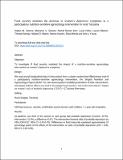| dc.description.abstract | Objective:
To investigate if food security mediated the impact of a nutrition-sensitive agroecology intervention on women’s depressive symptoms.
Design:
We used annual longitudinal data (4 time points) from a cluster-randomized effectiveness trial of a participatory nutrition-sensitive agroecology intervention, the Singida Nutrition and Agroecology Project (SNAP-Tz). Structural equation modelling estimation of total, natural direct, and natural indirect effects was used to investigate food security’s role in the intervention’s impact on women’s risk of probable depression (CES-D > 17) across three years.
Setting:
Rural Singida, Tanzania.
Participants:
548 food insecure, married, smallholder women farmers with children < 1-year-old at baseline.
Results:
At baseline, one third of the women in each group had probable depression (Control: 32.0%, Intervention: 31.9%, p difference=0.97). The intervention lowered odds of probable depression by 43% (OR=0.57, 95% CI: 0.43-0.70). Differences in food insecurity explained approximately 10 percentage points of the effects of the intervention on odds of probable depression (OR = 0.90, 95% CI: 0.83-0.95).
Conclusions:
This is the first evidence of the strong, positive effect that lowering food insecurity has on reducing women’s depressive symptoms. Nutrition-sensitive agricultural interventions can have broader impacts than previously demonstrated, i.e., improvements in mental health, and changes in food security play an important causal role in this pathway. As such, these data suggest participatory nutrition-sensitive agroecology interventions have the potential to be an accessible method of improving women’s wellbeing in farming communities. | en_US |

